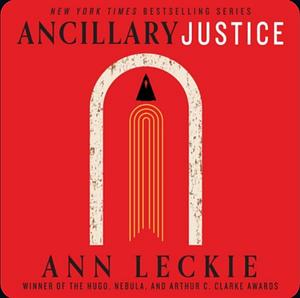Find a Review
Book reviews from Robin, co-host of the Books That Burn podcast. Bookshop links are affiliate links, we may receive a small commission if you purchase from our Bookshop. This content is CAN credentialed, which means you can report instances of harassment, abuse, or other harm on their hotline at (617) 249-4255, or on their website at creatoraccountabilitynetwork.org.
Featured
- Get link
- X
- Other Apps
Ancillary Justice by Ann Leckie (Imperial Radch #1)
On a remote, icy planet, the soldier known as Breq is drawing closer to completing her quest.
Once, she was the Justice of Toren -- a colossal starship with an artificial intelligence linking thousands of soldiers in the service of the Radch, the empire that conquered the galaxy.
Now, an act of treachery has ripped it all away, leaving her with one fragile human body, unanswered questions, and a burning desire for vengeance.
CONTRIBUTOR(S): Adjoa Andoh (Narrator)
PUBLISHER: Hachette Audio
YEAR: 2013
LENGTH: 416 pages (12 hours 41 minutes)
AGE: Adult
GENRE: Science Fiction, Speculative Fiction
RECOMMENDED: Highly
Queer Rep Summary: N/A - The protagonist uses "she" for everyone, so anything I could say would be guessing.
ANCILLARY JUSTICE is a story of slow burn revenge by a segment of a colonial empire against its leader. It deals with personhood, gendered language, and sliding scales of ethics in colonial forces. It doesn't propose to have obvious or easy answers to any of these questions, but it excels in coming at them sideways. One of the most obvious elements of this is the way the protagonist engages with gendered language. Her first language doesn't use gendered pronouns, so she defaults to "she" (or that language's equivalent) for everyone, unless she is specifically told another gender reference. At minimum, for someone like myself reading in English it creates the impression of a world filled with women, even if they're not. Her constant misgendering marks her as an outsider even to those who don't know she's an Ancillary. As a physical extension of a spaceship's AI, put into human bodies for seamless operation, the nature of her existence is the subject of many discussions about slavery, autonomy, and personhood. Each of her bodies had a history before they became part of her, and she is uninterested in anyone's attempts to kill her in order to get that person back. This seems like the kind of thing later books might explore more, but the foundations are laid for now with various debates and conversations as to exactly what kind of colonial forces are to be preferred: one where bodies are replaced with ancillaries of a ship (effectively killing them), or one where individual humans are left their own personalities and might engage in assault of various kinds against the people in their charge. Is the soldier who has already been killed better than the one who will randomly rape the populace? The answer of stopping colonization altogether has already occurred to someone, to be sure, but this is a story where changes take time, and the last body of a several-thousand-year-old ship is content to set up the pieces of her revenge slowly.
I enjoyed this and I'm very interested in where things go from here. I like the questions raised nearly as much as I appreciate not being given trite answers.
Graphic/Explicit CW for classism.
Moderate CW for misgendering, grief, religious bigotry, racism, xenophobia, drug abuse, drug use, violence, gun violence, slavery, colonization, murder, death.
Minor CW for grief, vomit, alcohol, rape, war.
- Get link
- X
- Other Apps
Popular Posts
The Rise and Fall of Snow: Why the Hunger Games prequel is good, actually
- Get link
- X
- Other Apps
When Miserable People Get Happy Endings: "Unlikeable" Protagonists in Alexis Hall's Writing
- Get link
- X
- Other Apps

Comments
Post a Comment